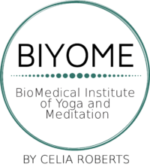200PAT Psychedelic-Assisted Therapy (PAT) Training Course (Trauma Informed)
A Yoga Australia Approved Training Course, Registered Psychedelic-Assisted Therapist & Training Course
Certificate of Psychedelic and Contemplative Therapies (CPACT)
The BioMedical Institute of Yoga and Meditation, BIYOME
BIYOME has collaborated with The Signs of Life Psychology to offer a Psychedelic-Assisted Therapy (PAT) training course that is crafted in alignment with emerging Australian standards.
Facilitators from The Signs of Life Psychology, namely Dr. Lani Roy and Melissa Warner, will provide comprehensive training in PAT skills and will be supported by a range of leading academics, psychiatrists and clinicians in the space.
Upon successfully completing this course and meeting the necessary skill prerequisites, you will acquire the proficiency to provide Psychedelic Assisted Therapy within the parameters of current regulatory government guidelines, fulfilling the roles of a Psychedelic Prescriber (PP), Psychedelic-Assisted Therapist (PAT), or Psychedelic Facilitator (PF). It’s important to note that for full accreditation as a Psychedelic Therapist, you must have eligibility for registration with a governing body such as:
- Australian Health Practitioner Regulation Authority (AHPRA)
- Australian Association of Social Workers (AASW)
- Psychotherapy and Counselling Federation of Australia (PACFA)
- Australian Counselling Association (ACA)
- Indigenous Allied Health Australia (IAHA)

What You Will Learn
The course is structured to cover key areas relevant to Psychedelic-Assisted Therapy & Complementary Therapies.
You will receive a Certificate of Psychedelic and Contemplative Therapies (CPACT).
Introduction to Psychedelic-Assisted Therapy:
- Overview of PAT principles and historical context.
- Exploration of TGA regulations and recent decisions impacting PAT in Australia.
- Trauma-Informed Approach to psychedelic therapy.
History and Foundations:
- Dive into the medicinal history of psychedelics.
- Explore the role of plant medicine in Indigenous traditions.
- Understanding cultural significance.
Consciousness, Buddhist and Yogic Connection:
- Uncover the nexus of psychedelics, consciousness, and ego death.
- Explore intersections with yoga, Kundalini awakening, and related themes.
- Delve into the science of consciousness and the use of psychedelics in research.
Psychoactive Substances:
- In-depth knowledge of commonly used psychedelic substances.
- Understanding dosage, effects, and contraindications.
- Exploration of Psilocybin, MDMA, DMT, Ketamine, and Cannabis with a focus on evidence-based research.
Client Assessment and Suitability:
- Techniques for pre-screening and assessing client suitability for PAT.
- Identifying potential risks and contraindications.
Clinical Skills Training for Psychedelic-Assisted Therapy:
- Practical training in administering PAT sessions.
- Techniques for ensuring a safe and supportive therapeutic and trauma-informed environment.
- Effective preparation, adaptive facilitation, and post-session guidance.
Complementary Therapeutic Modalities:
- Somatically focused therapies such as Trauma-Informed Yoga, Compassion-Focused Yoga Therapy, and Meditation.
- Trauma-Informed Meditation and Mindfulness-based approaches.
- Trauma-informed therapies that recognise the multiplicity of the psyche such as EMDR, Internal Family Systems, Structural Dissociation, Ego State Therapy, Resource Therapy, Clinical Hypnosis, Gestalt Therapy, Jungian Depth Psychology, Psychodynamic Psychotherapy, Schema Therapy, Transpersonal Psychology, Voice Dialogue.
Ethics and Legal Framework:
- Detailed exploration of ethical considerations in PAT.
- Review of legal frameworks and recent decisions impacting the practice.
Professional Development and Integration:
- Strategies for ongoing professional growth in the field.
- Best practices for integrating PAT into existing therapeutic modalities, including somatic therapies such as trauma-informed yoga, somatic experiencing, compassion-focused therapy, lifestyle medicine, creative arts, embodiment practices, trauma-informed meditation, and mindfulness.
- Nature-based therapy and indigenous philosophies and indigenous competency for psychedelic-assisted therapy.
- Explore current issues in the psychedelic space that impact accessibility and cultural safety of psychedelic-assisted therapy for Aboriginal and Torres Strait Islander peoples, and culturally informed models of care and practice that incorporate Indigenous ways of knowing, being and doing, and how IPAT can support your practice.
- How to integrate psychedelics into your current business model.
This extensive course not only meets the emerging Australian standards but also plays a proactive role in meeting the increasing training demand for authorised prescribers of psychedelic-assisted therapy. BIYOME is utilising the most up-to-date research, clinical and community practice regarding what fundamental education for PAT administrators, therapists, and facilitators involves.
